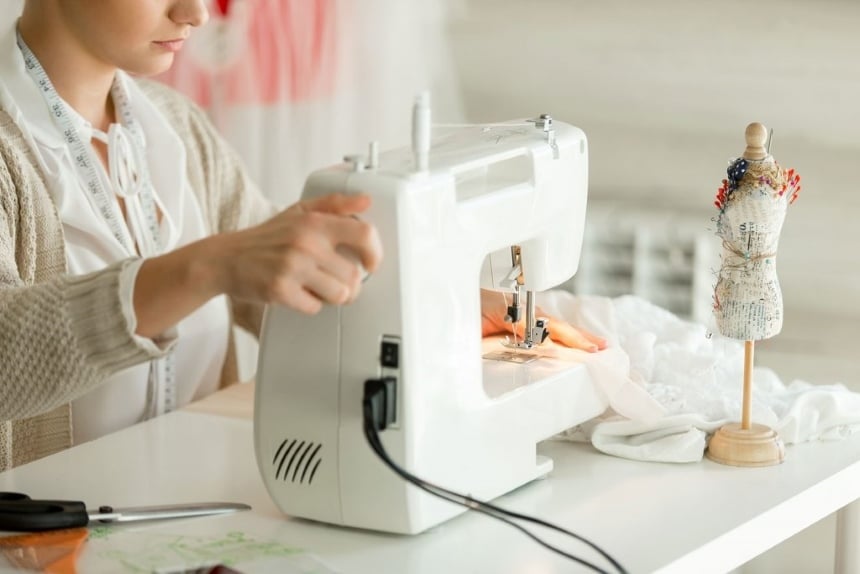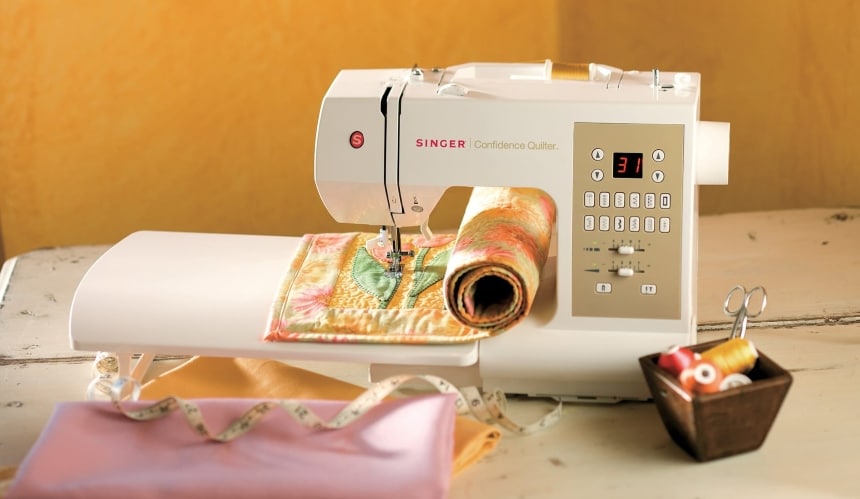

Torn between picking between a mechanical vs computerized sewing machine? We’re here to help! For the longest time, the mechanical sewing machine was dominant. It’s not until the late 1900s that the computer-controlled version was introduced.
So, do you take advantage of technology, move with the times and pick the latter? Does opting for the mechanical sewing machine mean you’re stuck in your ways?
What I can promise you is that both machines are solid options. And each has a set of pros and cons. The one you pick should be entirely a matter of preference—not compulsion. Let us help you arrive at the right decision for your needs.
 Before we go any further, it’s worth explaining what exactly a computerized sewing machine vs mechanical are? The differences between the two machines lie in the interface and settings. The mechanical sewing machine is as basic as it gets. It uses levers and knobs to adjust settings.
Before we go any further, it’s worth explaining what exactly a computerized sewing machine vs mechanical are? The differences between the two machines lie in the interface and settings. The mechanical sewing machine is as basic as it gets. It uses levers and knobs to adjust settings.
It follows that a mechanical sewing machine requires you to manually adjust its settings. You’re responsible for twisting the knobs, moving the lever, determining the stitch length and positioning the needle. Basically, everything you need to achieve your desired stitch. Are you looking to sew a straight or zigzag stitch?
 Computerized sewing machines on the other hand feature computerized controls. Adjusting the machine’s settings is as simple as pushing a button or picking a setting on an LCD display screen!
Computerized sewing machines on the other hand feature computerized controls. Adjusting the machine’s settings is as simple as pushing a button or picking a setting on an LCD display screen!
A computerized sewing machine uses a small computer to control the unit’s different functions. The computerized controls are responsible for pretty much everything; from adjusting your needle to your stitch length.
And as mentioned, this type of machine usually features a small display monitor designed to make operation easier. Plus, computerized sewing machines come with a bunch of integrated stitches making them extra versatile.
 You have all the facts, now you have to make a decision between the two. Which one are you buying? The best purchase is often one that serves your needs optimally. Ascertain that by answering the following questions.
You have all the facts, now you have to make a decision between the two. Which one are you buying? The best purchase is often one that serves your needs optimally. Ascertain that by answering the following questions.
Do you cringe at the thought of using “new age” tech gadgets or are you the type that simply loves to embrace technology?
If you’re not one to shy away from a challenge, by all means, pick a computerized sewing machine. Besides, you can always use the instruction manual or watch the countless YouTube videos available to figure out how to use the machine.
If however you prefer keeping it basic, stick to the mechanical sewing machine.
Which one is the better sewing machine for a beginner between the mechanical vs computerized model?
To a large extent, your years of experience in dress making can influence your purchasing decision. In our opinion, computerized sewing machines are much easier to operate if you’ve never attended a single dress making lesson!
Trying to override the years you learnt how to sew on a mechanical sewing machine and master the computerized version might prove to be a challenge for some. Besides, to others a mechanical sewing machine is as modern as it gets!
Do you view sewing as a hobby to whip up those simple and quick DIY home projects or repairs? A mechanical sewing machine will suffice.
If you’re however looking to take your sewing career to the next level, a computerized sewing machine with more features and function is a sensible buy.
At the end of the day, how much you’ve set aside for the machine will impact your decision. As previously highlighted, computerized sewing machines are much more expensive than mechanical machines.
Have you made your decision on which one to pick between the mechanical and computerized sewing machine? The machine you purchase should be one that you’re comfortable using. No use buying a machine that’ll give you a headache to operate.
Above all, make sure it’s durable and features a sturdy construction. Be sure to make your purchase from a reputable company which offers a reasonable warranty on their products. It’ll come in very handy in case the machine breaks down!
With that said, are you ready to make your pick?